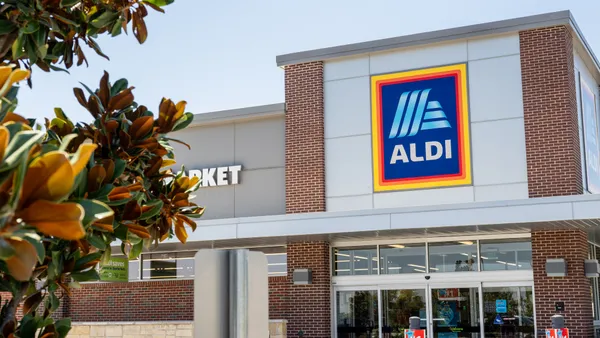Dive Brief:
- Instacart is adding a temporary 40-cent surcharge on orders placed through its marketplace to compensate its gig workers for the higher fuel prices they are facing, the e-commerce provider announced Friday.
- The company said the surcharge would take effect "over the next month," but did not provide details about how it will roll out the extra charge or indicate how long it would remain in place.
- Instacart is joining a growing number of delivery companies that have recently moved to help drivers cope with surging gasoline prices.
Dive Insight:
Instacart is requiring customers to pay extra when ordering goods through its app and website amid a rapid run-up in prices at the pump that the federal government said is unprecedented.
Spurred by Russia's invasion of Ukraine, gas prices rose 22% in the United States during the three-week period from Feb. 21 to March 14, according to the U.S. Energy Information Administration. That rate of increase is the fastest pace on record, although the average retail cost of a gallon of gas during the first two weeks of March, $4.21, was still lower than the all-time high recorded in June 2008 when inflation is taken into account, the agency said.
Instacart made clear that the fuel surcharge it is rolling out would be entirely passed on to its workers, adding that it would let them know in advance if orders include the charge before deciding whether to accept them.
"While shoppers on our platform tend to spend more time shopping and less time driving, we know that there is still an acute need to address rising gas prices and make sure we're supporting shoppers during this time," Tom Maguire, Instacart's vice president of operations and care, said in a statement.
Instacart's decision to ask customers to pay more to account for higher gas prices follows an announcement by DoorDash last week that it has launched a program to provide 10% rebates to its drivers when they buy gas using a prepaid business Visa debit card. In addition, DoorDash drivers who log 100 miles or more in a week while making deliveries will receive a bonus of at least $5, depending on the distance they travel.
On March 11, Uber said it would temporarily impose a fuel surcharge of 35 or 45 cents per order for food deliveries based on location, all of which it will pay to drivers. Grubhub, meanwhile, raised pay for its drivers starting March 9 by an unspecified amount designed to reflect regional increases in gas prices, Bloomberg reported.
Rising gas prices are playing a leading role in driving up inflation. The Consumer Price Index rose 7.9% during the 12-month period that ended in February, with food-at-home prices leaping 8.6% during that stretch, according to the U.S. Bureau of Labor Statistics.










